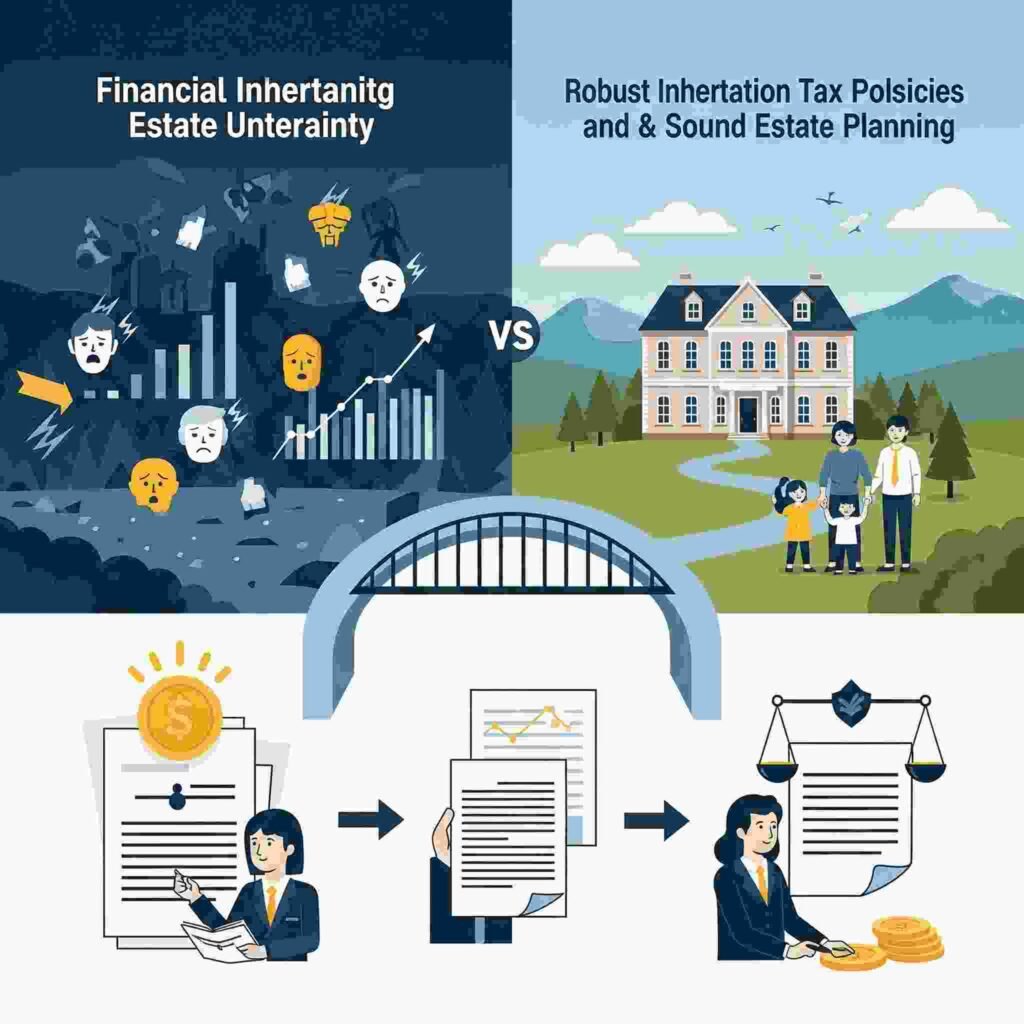Dodging the April 2026 IHT Hike: Wealthy Brits Snap Up Policies

There’s a right buzz going on in the financial world, and it’s all about inheritance tax policies. Loads of well-off individuals across the UK are absolutely piling into them. Since the 2024 Autumn Budget, it’s dead clear that April 2026 will be a huge moment for estates, with many expecting chunky inheritance tax (IHT) hikes. But the smart ones aren’t just waiting; they’re getting stuck in, investing in these inheritance tax policies to safeguard what they’ve built and spare their loved ones enormous tax bills. It just goes to show people are really twigging the need for solid estate planning, especially with how our finances keep changing.
For what feels like ages, inheritance tax has been a contentious old thing, often just called a “death tax” by many. With changes potentially on the cards in April 2026, getting a handle on its impact has never been more urgent. This isn’t just about saving a few quid, mind; it’s genuinely about safeguarding wealth that’s been built over entire lifetimes, making sure it passes smoothly to the next generation. And believe me, getting hold of the right inheritance tax policies is fast becoming the top way to do exactly that.
Table of Contents
Why the Rush for Inheritance Tax Policies Now, Then?
That 2024 Autumn Budget, while not laying out every single tax alteration in black and white, definitely set the stage for what’s coming. Financial experts and wealth advisors have been poring over every last bit of it, and the general consensus points squarely towards IHT rules tightening up a fair bit come April 2026. This anticipation has honestly led to a real surge in people taking out inheritance tax policies. Folks are rightly a bit worried about their estates potentially getting chipped away at. https://primelifecover.com/uk-life-insurance-and-inheritance-tax-2026/
Here’s a quick rundown of why everyone’s in a hurry:
- Anticipated IHT Rate Increases: Nothing’s confirmed yet, but the whispers suggest potential tweaks to IHT rates or the thresholds, which could mean bigger tax bills down the line.
- Frozen Nil-Rate Bands: The current nil-rate band (£325,000) and the residence nil-rate band (£175,000) have been stuck where they are. That means, with asset values going up, more and more estates are getting dragged into the IHT net.
- Economic Uncertainty: The wider economic climate just makes people want to properly secure their financial future. Planning meticulously for everything, including these death duties, just makes sense. moneyhelper.org.uk
- Proactive Wealth Management: Wealthy individuals, by their nature, are always ahead of the curve. They know full well that dragging your feet can cost you dearly. So, investing in inheritance tax policies now is seen as a genuinely shrewd move.
Understanding Inheritance Tax and Your Estate

Inheritance tax gets slapped on a person’s estate – that’s their property, all their money, and everything they own – once they’ve passed away. The standard IHT rate right now is 40% on anything above the nil-rate band. While there are a few exemptions and reliefs dotted about, trying to get your head around all the complexities can be a real pain. And that’s exactly why inheritance tax policies are getting so popular. They give you a clear, structured way to sort out these liabilities ahead of time.
Let’s quickly go through a few key IHT bits and bobs:
| Concept | Description |
| Nil-Rate Band (NRB) | The amount up to which an estate doesn’t owe any IHT. Currently stands at £325,000. |
| Residence Nil-Rate Band (RNRB) | An extra bit of nil-rate band you can use if a main home is left to direct descendants. Currently £175,000. |
| Potentially Exempt Transfers (PETs) | These are gifts you make while you’re alive that become exempt from IHT if you manage to live for seven years after giving them. |
| Exemptions | Certain gifts are completely off the hook for IHT, like things you give to your spouse or civil partner, charities, or political parties. |
| Business Property Relief (BPR) | A bit of relief for certain business assets, which can chop your IHT bill on them by 50% or even 100%. |
| Agricultural Property Relief (APR) | Pretty similar to BPR, but this one’s for qualifying agricultural land and buildings. |
The clever bit is that using inheritance tax policies often works hand-in-hand with these existing reliefs, giving you a much more thorough way to manage just how much IHT you might be on the hook for.
What Are These Inheritance Tax Policies All About?

When we chat about inheritance tax policies, we’re mostly on about a range of financial products. They’re designed either to reduce the value of your estate that’s subject to IHT or to cough up the cash to cover the IHT bill when it eventually lands. These aren’t just one-size-fits-all deals, mind you; they’re very much tailored to your individual circumstances and how much your estate is actually worth. https://primelifecover.com/homebuyer-life-insurance-uk-2025/
Here are the sorts of inheritance tax policies you’ll commonly hear about:
- Whole of Life Policies Written in Trust: This is probably the most common, and frankly, one of the most effective types of inheritance tax policy. What happens is, you take out a life insurance policy, and the payout from it gets put straight into a trust. Because that policy is held in a trust, the money it pays out is typically considered outside of your estate for IHT purposes. So, when you eventually pass away, the people who benefit from that trust get the funds, and they can then use that money to pay the IHT bill without having to sell off other bits and bobs from your estate. It’s a neat way to ensure the IHT is paid quickly and without fuss.
- Discounted Gift Trusts (DGTs): These let you pop a gift into a trust, but you still get to keep receiving regular payments – either income or capital withdrawals – from that trust. The amount you’ve gifted is immediately taken out of your estate for IHT, though it’s subject to a discount that’s worked out based on your age and health. The value that’s removed from your estate basically becomes what’s called a ‘potentially exempt transfer’. vitality.co.uk
- Loan Trusts: In this setup, you lend money to a trust, rather than simply giving it away. The trust then invests that money, and any growth or profits from those investments belong to the trust and are therefore outside your estate. Your original loan itself remains part of your estate, but any growth on it isn’t. This one’s particularly appealing if you fancy retaining access to the original cash if you ever need it back.
- Business Relief (BR) Qualifying Investments: Okay, so not strictly a ‘policy’ in the same way, but investing in certain unlisted companies or shares listed on AIM (the Alternative Investment Market) can qualify for Business Relief. This can actually reduce or even completely wipe out the IHT on those particular assets after a specific qualifying period, usually two years. Financial advisors often suggest these as part of a much bigger plan that includes other inheritance tax policies. https://primelifecover.com/ai-life-insurance-uk-smarter-cover-2025/
The crucial thing to take away from all this is that these inheritance tax policies offer perfectly legitimate and genuinely effective ways to lighten the load of IHT.
The Role of Professional Advice in Securing Your Legacy

Trying to figure out all the twists and turns of IHT and then picking out the right inheritance tax policies? Well, that’s definitely not something you want to tackle on your own, is it? The financial world is forever shifting, and what might’ve been spot on a few years back might not be your best bet today. This is where getting expert advice from a proper qualified financial advisor, especially one who specialises in estate planning, becomes absolutely, truly priceless.
A good advisor will really get stuck in and:
- Assess Your Full Financial Picture: They’ll properly understand all your assets, what you owe, your income, and where your money goes.
- Gauge Your IHT Exposure: They’ll work out what your potential IHT bill might look like and pinpoint where you can trim it.
- Recommend Tailored Solutions: They’ll suggest the most suitable inheritance tax policies that are a perfect fit for your specific circumstances and what you’re hoping to achieve.
- Structure Trusts Effectively: They’ll make sure any trusts you set up are absolutely bang-on, so they actually deliver the IHT benefits you’re aiming for.
- Provide Ongoing Review: They’ll regularly check in on your plan to make sure it’s still doing its job, especially if there are any changes to the law or your own personal situation.
Honestly, loads of people are currently seeking advice specifically on inheritance tax policies to make sure they’re completely ready for April 2026.
Don’t Delay: Get Your Inheritance Tax Policies Sorted Now

The clock’s ticking, don’t forget. While April 2026 might seem a fair old way off, getting your estate planning sorted, particularly when it means setting up inheritance tax policies, takes a bit of time. You’ve got applications to fill out, trusts to establish, and sometimes even medical checks for life insurance policies. Getting cracking early means you can take a much more considered, all-encompassing approach, ensuring that whatever inheritance tax policies you choose are fully in place and ready to do their job when they’re needed.
The message from that 2024 Autumn Budget is pretty clear: the government’s looking down every avenue to bring in more cash, and IHT remains a significant earner for them. By taking the bull by the horns and investing in inheritance tax policies now, you’re not trying to wriggle out of your responsibilities. No, you’re simply planning cleverly to ensure your hard-earned wealth actually gets to your chosen beneficiaries as smoothly and efficiently as humanly possible. It’s just smart money management, really.
Frequently Asked Questions (FAQs)
Q1: What’s the big worry about inheritance tax in April 2026?
The main concern is the anticipated adjustments or potential hikes to inheritance tax policies following the 2024 Autumn Budget. This could mean bigger IHT bills for estates. Many folks reckon the government’s got its eye on bringing in more from IHT.
Q2: How do inheritance tax policies actually help, then?
Well, inheritance tax policies are financial products – mostly life insurance policies put into a trust, or special trusts designed to get assets out of your estate for IHT. They either bring down the value of your estate that’s subject to IHT, or they provide the funds to cover that IHT bill without having to touch any other assets.
Q3: Are these policies only for the super-rich?
While often used by those with a lot of money, anyone whose estate is valued above the nil-rate band (that’s currently £325,000, or more if you include the Residence Nil-Rate Band) could genuinely benefit from thinking about inheritance tax policies as part of their estate planning.
Q4: Is it too late to start planning for IHT with these policies?
Absolutely not, but honestly, the sooner you get on with it, the better. Setting up inheritance tax policies and trusts can take a while, so getting started early ensures everything’s properly sorted well before those anticipated April 2026 changes hit.
Q5: Can I sort out these policies myself, or do I need an advisor?
While there’s some basic information floating around, setting up effective inheritance tax policies often involves quite complex legal and financial stuff. It’s always, always highly recommended to have a chat with a qualified financial advisor or an estate planning specialist. They’ll make sure the policies are spot-on for your situation and set up correctly.
Disclaimer
Just a quick heads-up: the information you’ve read here about inheritance tax policies is purely for general knowledge and should absolutely not be taken as financial or legal advice. Inheritance tax laws are a bit of a maze and can change. It’s crucial to get proper, tailored advice from a qualified financial advisor or a legal professional before you make any big decisions about your estate planning or decide to buy any inheritance tax policies. This content isn’t trying to push any specific financial products or providers, just so you know.
Take Action Today!
Look, don’t let those potential April 2026 inheritance tax hikes catch you on the hop. Get a grip on your financial legacy. Seriously, give a qualified financial advisor a bell today to chat about how inheritance tax policies can truly protect your wealth and give your loved ones some proper peace of mind. Secure your future, and make sure your hard-earned assets pass down as efficiently as possible.
Author Box
*Written by DN Patel
Founder & Life Insurance Specialist
Helping families in USA, UK, Canada & Australia choose the right life cover.






One Comment